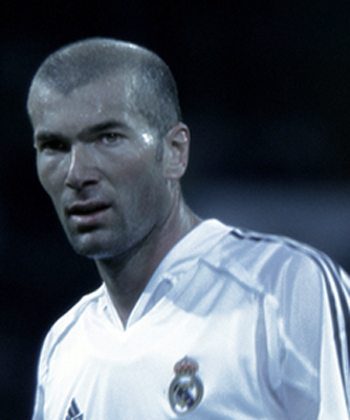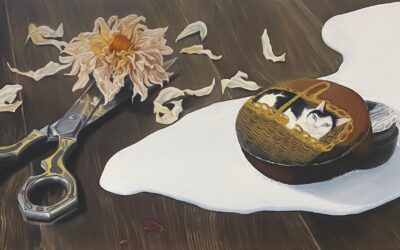[dropcap style=”font-size:100px; color:#992211;”]Z[/dropcap]inedine Zidane is a man of few words, and fewer explanations, yet he holds the gaze of the wider world more consistently than any other footballer alive today.
In 1998 he was the lynchpin of French World Cup victory, and this year it was his return to form that steered an otherwise lacklustre team all the way to the final, only for him to be sent off after committing the most ostentatious and inexplicable foul in recent times. In the following days he was given a small punishment, along with the man he knocked over, he apologised only to children for what they saw, and despite his refusal to express regret, he received both the backing of his team mates, and the thanks of a grateful nation. No opprobrium, no vilification, no disgrace. The red card and his slow walk past the World Cup Trophy into the dressing room became a shocking – but somehow appropriate – end to the illustrious career of a player who transcended the game.
 This unique set of events becomes all the more remarkable after watching the film Zidane; Portrait of the 21st Century and seeing his fate foretold: an eerie paratextual premonition of the Zidane’s final footballing moments in Berlin. Before seeing the film, he was a villain of the first order, guilty of levelling his head at another player and sending him crashing to the ground, of throwing his team’s chance of victory away with only ten minutes of play remaining, of reacting to deliberate but predictable provocation with a violent outburst that demeaned the professionalism of a long career at the top. After seeing the film, his behaviour becomes predictable, inevitable: the necessary reaction of a man who stands astride the game itself. We are confronted with the question, how can the game’s greatest player commit the game’s greatest foul without saying something important about the game?
This unique set of events becomes all the more remarkable after watching the film Zidane; Portrait of the 21st Century and seeing his fate foretold: an eerie paratextual premonition of the Zidane’s final footballing moments in Berlin. Before seeing the film, he was a villain of the first order, guilty of levelling his head at another player and sending him crashing to the ground, of throwing his team’s chance of victory away with only ten minutes of play remaining, of reacting to deliberate but predictable provocation with a violent outburst that demeaned the professionalism of a long career at the top. After seeing the film, his behaviour becomes predictable, inevitable: the necessary reaction of a man who stands astride the game itself. We are confronted with the question, how can the game’s greatest player commit the game’s greatest foul without saying something important about the game?
[quote]reacting to deliberate
but predictable provocation
with a violent
outburst that
demeaned the
professionalism of
a long career[/quote]
The film itself was made by a two artists who trained sixteen cameras on Zidane for the entire length of a game between Real Madrid and Villareal. All this footage was then edited into a video collage through which the entire game is watched only in terms of Zidane’s participation. There is no narrative structure aside from the game, but watching a single player allows for a heightened sensitivity to the shifting moods of play. The opportunistic sparring at the beginning, the rising tension, the sustained attacks and the lofting spirits of the crowd, followed by the attritional frustration of the fading moments.
French footballers tend to construct very different images than their English counterparts. They have a long tradition of narrating their experiences through epithets and aphorisms. Zidane’s appearance as the subject of an art film seems, therefore, only to be expected . Few, if any, contemporary footballers would lend themselves so easily to the form. Words culled from interviews with him are subtitled under the picture to reveal the inner thinking of the enigma looming above. The effect is mesmerizing. A routine game is transformed into an existential ellipse: Zidane choreographed onto fate, finding meaning in his movements at one remove from their purpose; as if the truth of playing football lies in harmonising action with destiny and giving birth to a prefigured end.
Other commentators have remarked on Zidane’s lack of expression, but in stiffening his face into an intense and mordant grimace, he does not lose expression, he becomes it. He is not simply immersed in the torrent of game and crowd that embrace him, he becomes the torrent, and the rock on which it breaks. The cameras search him out because, like north to a compass, they could point nowhere else. His slow clockwork pace reinforced by a distinctive chipping of his toes in a deliberate and practiced, stuttering, half-stepped gait. His long stride, straight back and unerring direction carve out space wherever he goes, balancing on two legs as if he had four, never losing possession. We are not watching a game of football, so much as experiencing it for ourselves, through the perspective of the best player on the field.
The film – just like the World Cup final in Berlin – ends with a sudden and unexpected confrontation. Zidane rushes towards a group of players, and the rest is a blur. When order is restored, Zidane stands like a condemned man. The referee reaches into his pocket and sends him off without hesitation. The penalized player turns and stalks towards the dressing room – no backward glance – indifferent. Clearly, he knew the referee had no choice and he did not ask the official to make one; as if being sent off was something that he, Zidane, alone decided, the referee was incidental. Déjà vu: Berlin.
[quote]Had he not gone
swimming the day
after his mother died,
and merely paid lip
service to regret
in the aftermath of the
shooting, he would
have suffered no
serious punishment.[/quote]
Albert Camus is regularly invoked when talking about French footballers. He played football, claimed to have learnt much from it, and – like practitioners of the sport— is an archetype of insouciant, French cool. It is, however, usually Camus we refer to, not his characters, yet as soon as Zidane levelled Matterazzi on that hot Berlin day in July, he stepped into the shoes of the condemned Mersault, the man who shot a nameless Arab on a Maghreb beach in The Outsider. The parallels are uncanny: the sun, the plurality of confrontations, the ruthless finality, and the shadow of Zidane’s mother in the background. Zidane was an absolute villain, whose foul was so flagrant that he could only be sent off. The crowd, both at the stadium and across the face of the globe – perhaps two billion people – saw an escalating cycle of variously angled repeats. Facial expressions were studied, lips read, theories formulated, and Zidane’s character analysed by every armchair sportsman in the world.
Mersault found himself in trouble, not so much for killing an Arab, but for failing to observe the bourgeois pieties of mourning his mother and his searing honesty with regard to his own lack of regret. Had he not gone swimming the day after his mother died, and merely paid lip service to regret in the aftermath of the shooting, he would have suffered no serious punishment. Instead he was executed for his emotional detachment. Zidane too refused to speak the standard litany of apology, acknowledgment and regret. He chose instead to stand in front of the world’s press and invite censure. Faced with this, the footballing hierarchy looked him directly in the eye, and blinked. He had done a terrible thing and had stained the final moments of a legendary international career, but they could only slap his wrist and chastise his victim, essentially justifying his assault.
What they could not admit to, was that Zidane had forced their hand. Matterazzi would never have been punished had Zidane not floored him. His verbal abuse would have been ignored. Footballers are expected to put up with insults, with career threatening fouls, and with the ridiculous pretence of other players diving all over the pitch. It’s called professionalism. They are expected to exaggerate the extent of their own pain, claim things they know to be untrue, and bitterly complain when decisions go against them whether they know them to be right or wrong. Everything is excused, every lie, every kick, every piece of fakery and bogus indignation, as long as it helps bring victory. So when Zidane launched his head into Materazzi’s chest, knowing he must be sent off, he staged a small but important rebellion against the poisonous ethos of ‘victory at all costs’ that suffocates true sportsmanship. He placed his own sense of personal honour above the interests of victory, and walked away.
Football is often described as war without killing. In both, war and football, victory often goes to those who break the rules most readily and effectively. Superior force alone permits a country to stay on the moral high ground. If defeat looms, arguments about civilian casualties are pushed to one side. Increasingly in our world, the defeated find solace in a kind of messianic savagery, such as we now witness in Iraq. This is the logical terminus of ‘victory at all costs’, where the death of oneself and one’s principles are necessary steps in a war for eternity. But when we compare football to war, we elevate this awful, sacrificial motif to a central place in our lives.
[quote]Does the end
justify the means?
That is possible,
but what will
justify the end?’
Camus; The Rebel[/quote]
In the film, in his career, and in Berlin in July, Zidane has always sketched out the limits of the world in which he lives. He declares his multiple loyalties, yet claims the French jersey by right of choice and talent. In playing for France, he and others have shown a new France to itself, and the current social tensions are evidence of an emerging crisis of identity, but this is an identity problem for France, not for Zidane. By the simple fact of his existence – his history and extraordinary talent – Zidane affects the language politicians use to discuss this problem. Though saying little, he nonetheless inscribes the limits of the debate. In football, he shows us the tawdry conflict between the rules of the game, and its overwhelming ethos. He reminds us that cheating is not simply accepted, it is expected, and where rules are normally maintained to protect a higher system of values, the prevailing code of football is that rules are an obstacle to victory, that true talent must be fouled and insulted, that winning excuses everything. Where Camus says that integrity has no need of rules, football has no place for integrity, except at the receiving end of a red card.
What Zidane showed us in those brief moments, is that there are things that we should not put up with, codes that we should not follow, and that victory pursued at all costs eventually costs all.
[quote]…the accused is never
produced and killed
before the
eyes of the world
unless he consents
to say that his
death is just…’
Camus; The Rebel[/quote]
Victory is the worthy prize of sporting genius, but should not be the cause of our debasement. Zidane was a better footballer than football deserved, and with one final flourish during the last World Cup he showed the whole world what a hollow game it is, and how great it can be. Camus wrote the words, ‘Rebellion cannot exist without a strange form of love’, by being the only player in the history of the game to have been both instrumental in winning the World Cup, and indifferent to losing it when it was almost within his grasp, Zidane showed us what those words meant. It was his love of the game that both produced his genius, and broke his subordination to victory. Through his reaction to a casual and unnecessary insult, he revealed the hidden truth that the greatest prize in football is not the World Cup, but the spirit of the game itself.
Douglas Bulloch was born in Canada, grew up in the UK and lives in Shanghai. He spent many years working on the financial reporting side of the oil business before returning to academia to write a political-theory heavy PhD in International Relations. His two young children leave him little time to think, but give him many reasons to



















